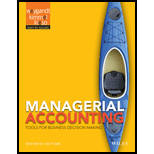
a)
Traditional Product Costing: Accounting process to determine the total cost incurred to manufacture a product on the basis of volume metric is known as traditional product costing.
Overhead: Overhead refers to the costs, which are utilized in business activities, however cannot be related to a specific activity or product.
Direct Labor Cost: Direct labor cost is the cost of the labor paid to the employees who are directly involved in the conversion of the raw materials to the finished products. For example: Wages paid to the mechanic.
To compute: Total
b)
Activity-Based Costing (ABC): Under activity-based costing the different cost is assigned to a different activity. The cost is determined on the basis of the activities performed by the business.
Overhead: Overhead refers to the costs, which are utilized in business activities, however cannot be related to a specific activity or product.
To Prepare: A schedule showing computation of overhead rates under activity-based costing.
c)
Cost Driver: The cost driver refers to the all the activities on which the money is spent to produce the product or the service. It has a cause-effect relationship with the resources utilized in production. The cost drivers are used to form the activity cost pools.
Activity cost pool: Activity cost pool refers to the overhead cost related to an activity. This is often calculated to get an accurate estimate of the production cost.
To Prepare: The schedule to assign activity’s overhead cost pool to each product based on the uses of cost driver.
d)
Activity-Based Costing (ABC): Under activity-based costing the different cost is assigned to a different activity. The cost is determined on the basis of the activities performed by the business.
To Compute: The total manufacturing cost per unit for each product under activity-based costing.
e)
Activity-Based Costing (ABC): Under activity-based costing the different cost is assigned to a different activity. The cost is determined on the basis of the activities performed by the business.
Traditional Product Costing: Accounting process to determine the total cost incurred to manufacture a product on the basis of volume metric is known as traditional product costing.
Overhead: Overhead refers to the costs, which are utilized in business activities, however cannot be related to a specific activity or product.
To Write: A memo to JE discussing the implications of the analysis done.
Want to see the full answer?
Check out a sample textbook solution
Chapter 4 Solutions
Managerial Accounting: Tools for Business Decision Making
 Cornerstones of Cost Management (Cornerstones Ser...AccountingISBN:9781305970663Author:Don R. Hansen, Maryanne M. MowenPublisher:Cengage Learning
Cornerstones of Cost Management (Cornerstones Ser...AccountingISBN:9781305970663Author:Don R. Hansen, Maryanne M. MowenPublisher:Cengage Learning
